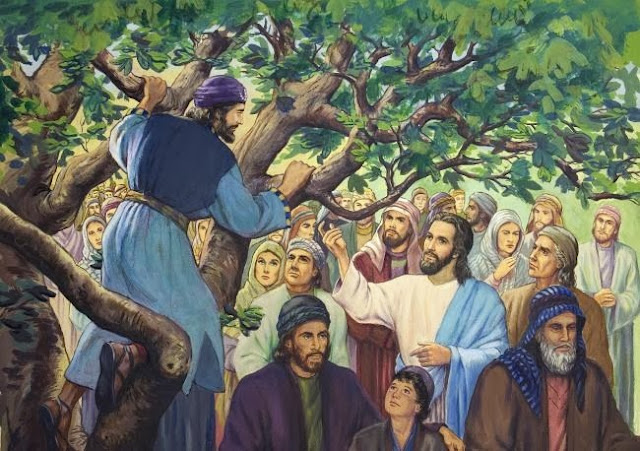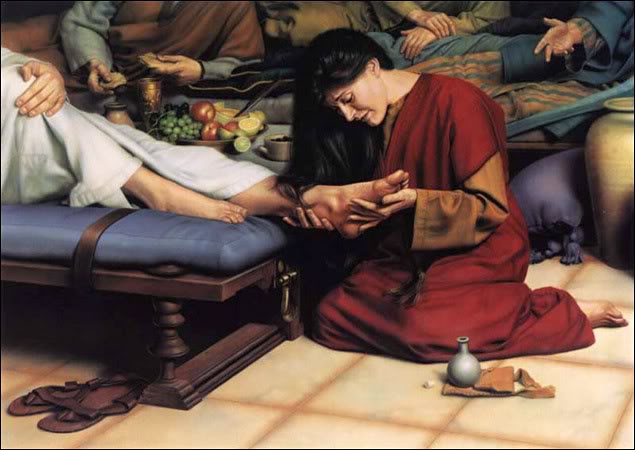Then let us celebrate with a feast, because this son of mine was dead, and has come to life again; he was lost, and has been found.’
Lk 15: 1-3. 11-32
For exegesis by verse, please click >>
4th SUNDAY OF LENT 2010
FROM G.B. CAIRD
This story is the best known and best loved
of all the parables of Jesus, justly treasured for its exquisite literary grace
and penetrating delineation of character as well as for its assurance of a
divine mercy surpassing all expectation.
But the traditional title - 'The Prodigal
Son' - does less than justice to the purpose of the parable, as the opening
sentence makes clear. 'There was a man who had two sons', and he lost them
both, one in a foreign country, the other behind a barricade of self-righteousness.
The elder contrived, without leaving home, to be as far away from his father as
ever his brother was in the heathen pigsty.
Both brothers were selfish, though in
totally different ways. The selfishness of the younger brother was a reckless
love of life. He asked for his patrimony because he wanted to savour to the
full the manifold delights the world could offer, not foreseeing that truant
independence would lead to penury and ignoble serfdom. The selfishness of the
older brother was less obvious and less vulnerable. He asked for nothing,
desired nothing, enjoyed nothing. He devoted himself dutifully to his father's
service, never disobeying a command of his father, and thought, no doubt, that
he was the model of unselfishness; yet he himself was the centre of his every
thought, so that he was incapable of entering sympathetically into his father's
joys and sorrows.
It was common practice for a man, during
his lifetime, to make over his property to his heirs by deed of gift, retaining
the life rent for himself The younger son persuaded his father to do this, but
also to give him immediate control of the inheritance which, in the ordinary course
of events, would have come to him at his father's death. This explains why, at
a later stage in the story, the father could say to the other son, 'all that is
mine is yours', though he himself was still master of the family farm.
We are not told in detail how the younger
son squandered his fortune. His brother, not trying to be just, let alone
charitable, chose to believe that he had added profligacy to extravagance, but
he had no more evidence for the harlots than his imagination and bad temper
could supply.
One way or another, however, the prodigal
was reduced to extremity: to a Jew no fate could be more degrading than to feed
pigs for a Gentile master. Adversity brought him to his senses, calling up
memories of comfort and security, once heedlessly enjoyed and now forfeited,
compelling him to admit to himself that he had been a fool, steeling him to
make a similar admission to his father.
Yet even at this stage he knew too little
of his father to think in terms of forgiveness and restoration. It took the
impetuous munificence of his father's welcome, interrupting his carefully rehearsed
confession and blotting out the recollection of disgrace, to make him realize,
as he had never realized before, what it meant to be his father's son; 'they
began to make merry', and the prodigal began to discover at home what he had sought
in vain among the counterfeit pleasures of the far country.
The elder son displays an unattractive
facet of his personality with every word he speaks. When he hears the
merriment, his impulse is not to join in but to ask for an explanation. The
news of his brother's return sets him thinking of his own rights and deserts,
jealously supposing himself to be wronged because his brother is treated with
more than justice.
When his father pleads with him, he
interrupts with a harsh protest, which contains perhaps more truth than he
intended - 'Look how many years I have slaved for you'; working for his father
has been an unrewarding servitude, and the obedience he is so proud of has been
slavish and mercenary, never filial. He disowns his brother, calling him 'this
son of yours', and putting the worst possible construction on his conduct.
The father refuses to be forced into taking
sides with the one brother against the other; with all their shortcomings he
loves them both and has never ceased to regard them as sons, though each in his
own way has tried to contract out of his place in the family. He administers
the gentlest of rebukes: his dear son who has remained with him all along
should have understood him well enough to share his joy over 'this your
brother'.
The parable leaves us with an unanswered
question: did the elder son persist in his jealous rage? Or did he follow the
lead of his brother, admit that he had made a fool of himself, and join the
festivities? The question was left unanswered by Jesus because it was one which
his listeners had to answer for themselves.
The parable was told not to offer a
generous pardon to the nation's prodigals, but to entreat the respectable Jews
to rejoice with God over the restoration of sinners, and to warn them that,
until they learnt to do this, they would remain estranged from their heavenly
father and pitifully ignorant of his true character.









































